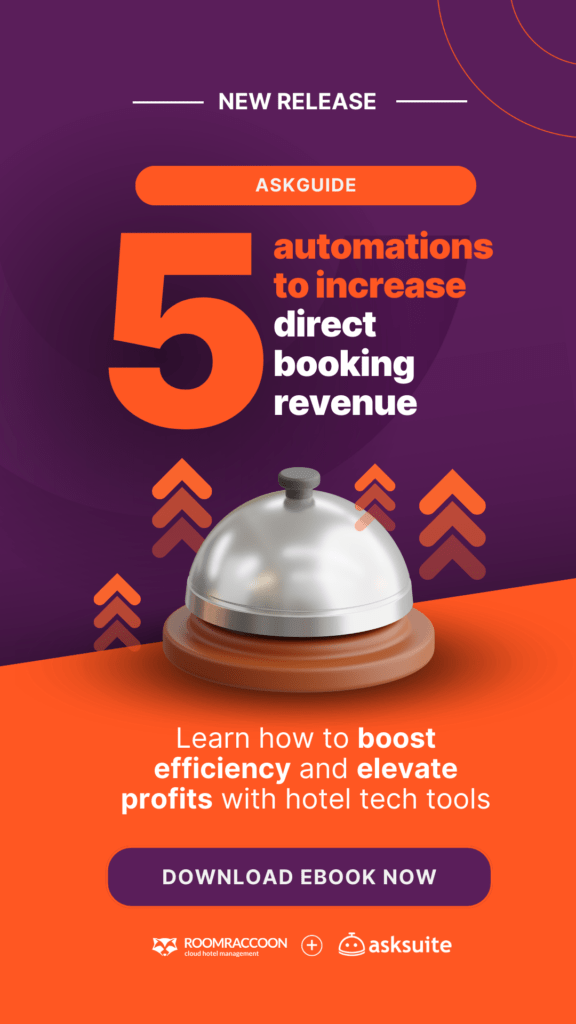In the current digital era, having the top-rated hotel in the city isn’t enough to guarantee success. If your online marketing strategy isn’t up-to-date, your guests will likely have a hard time finding you. With 90% of all online experiences beginning with a search engine, potential customers find hotels like yours on Google.
That means you need to make your online presence known by optimizing your SEO keywords for hotels — especially if you want to beat your competitors.
The question is, how do you find keywords for a website that’ll make sure you rank in the top 10 in your customers’ SERPs?
In this article, we’ll cover all the fundamentals of choosing the right SEO keywords for hotels, including:
- Why keyword research is the most crucial part of a strong SEO strategy
- The most effective tools and techniques for detecting SEO keyword opportunities
- How to sort through and refine your keyword research, and
- Three metrics you can use to help narrow down your list of primary SEO keywords
In the end, you’ll know everything you need to know about how to maximize your chances of ranking high on SERPs, drive more traffic to your website, and boost your occupancy rates.
First, let’s start by expanding on why keyword research plays a significant role in any hotel’s digital marketing strategy.
Good copywriting can boost your conversations rates on your content. Here you find a FREE simple guide to quick improvements:
Importance of Keyword Research for Hotels
It’s best to adopt your customers ‘ perspective before considering new keywords that you think will propel you to the top of SERPs.
That’s why it’s essential to do some preliminary research into the best keywords to rank for based on competitors’ websites. It not only gives you a real sense of which SEO keywords are working for your competitors but will also help you decide how you want to differentiate yourself with your SEO marketing.
Now that we understand why keyword research is vital for your hotel from a business standpoint, we’ll dive into the three basic steps for conducting keyword research:
- Look for opportunities on SEO Keyword for Hotels
- Evaluate and assess the new keywords for hotels that you found
- Pick out the best keywords for hotels that you can rank for
Let’s begin with the first step.
Step 1: Look for Opportunities on SEO Keyword for Hotels
The key ingredient to any keyword research strategy is having an effective keyword research tool, such as Google’s Keyword Planner or SE Ranking. These SEO tools gather essential data that will help you differentiate the best keywords you should be focusing on from low-value keywords that won’t bring you much relevant traffic.
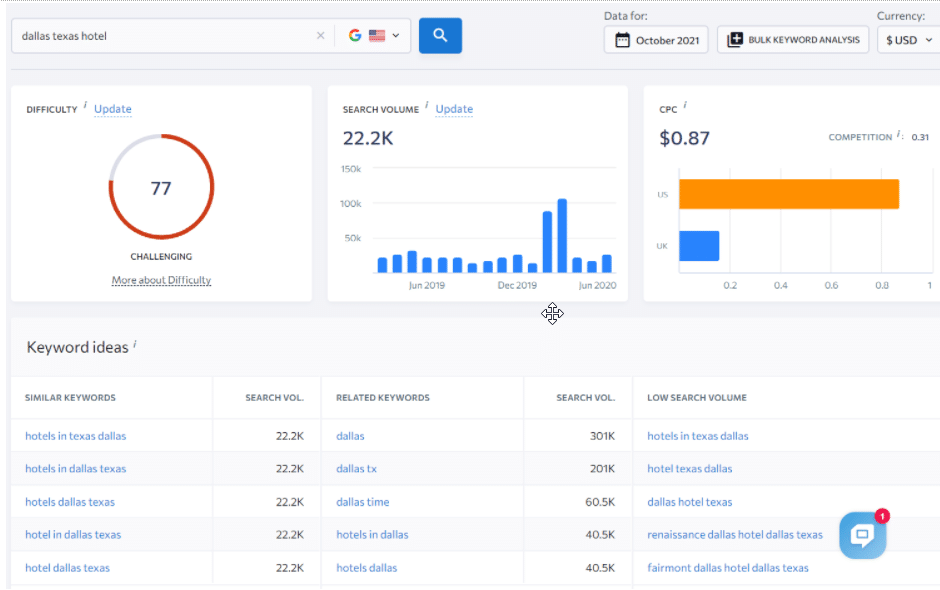
Now that you’re equipped with the right SEO tools, it’s time to start looking for different opportunities on SEO keywords for hotels in your area:
1. Spot Your Basic Short-tail keywords
In this early phase of your keyword research, it’s best to begin by using short-tail keywords, search queries composed of three or fewer words. For hotels, in particular, we recommend leading your research by listing out essential short-tail keywords that anyone would use when looking for hotels in a given city, like “[name of city] hotels” or “hotel in [name of city].”
For example, if we were performing keyword research for a hotel in Dallas, Texas, we’d start by analyzing a short-tail keyword like “Dallas texas hotel.”
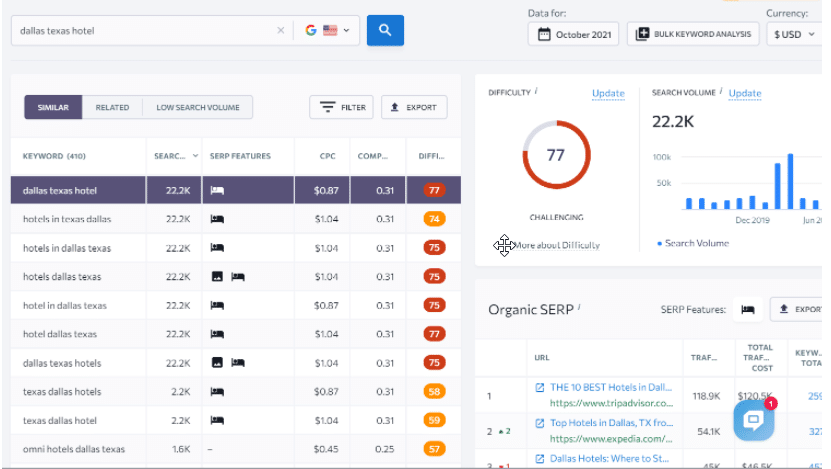
As you can see in the screenshots above, once we’ve looked up “Dallas texas hotel” using the SE Ranking keyword research tool, we’re given entire lists of other new keywords that are similar or related to the keyword we searched for.
This iterative process of expanding and branching out from your initial list of short-tail keywords is helpful for the next step in identifying opportunities on SEO keywords for hotels: looking for more diverse keyword ideas.
2. Find additional keyword ideas
Once you’ve compiled your initial list of short-tail SEO keywords for hotels, you can start to look for different keyword ideas by researching other types of searches that tourists might use when planning their vacation.
That could include new keywords based on various categories of search terms, such as:
- Local competitors
- Nearby attractions
- Seasonal events
- Different geographical levels (e.g., state, city, neighborhood)
- Hotel type
Let’s take a quick look at examples of the best keywords in each of these search categories.
Competitors
A reliable way to grasp which hotel keywords and phrases are used by your competitors is to use a tool like SE Ranking’s Keyword Suggestion tool to lookup key phrases with your competitors’ brand names.
If we continue our example for hotels in Dallas, we might look up competitor-related searches like:
- “Hilton Hotel Dallas”
- “Hyatt Regency Dallas”
- “Pittman Hotel Dallas”
Local Points of Interests
If you’re fortunate to have your hotel located near a local exhibit like a monument, well-known restaurant, or other attraction, use that to your advantage.
Following our example of hotels in Dallas, Texas, if your hotel is situated near tourist sites like the Kennedy Memorial or the SXSW Conference, you could use phrases like:
- “Hotels near the Kennedy Memorial”
- “Hotels near SXSW”
Seasonal Events
Any special events hosted in your local area during a particular season can serve as an excellent opportunity to find related keywords. For instance, if your guests are looking for hotels in Dallas during Christmas, you might look at keywords such as:
- “Dallas Hotel Christmas Show”
- “Dallas Hotel Boho Market”
- “Dallas Hotel Cotton Bowl”
Region (e.g., state, district, neighborhood)
In addition to primary keywords like “Dallas Texas Hotel,” you can try searches that involve names of specific geographical parts of your local area. For example:
- “South Dallas Hotel”
- “Cedars Dallas Hotel”
- “Pleasant Grove Dallas Hotel”
Category of Hotel
You can also use modifiers based on different types of hotels, especially if it’s relevant to the kind of hotel. For instance, depending on the particular category of hotel you’re promoting in Dallas, you might look at keywords like:
- “Resort near Dallas”
- “Luxury Hotel Dallas”
- “Motel Dallas”
- “Extended Stay Hotel Dallas”
Now that you have a sense of all the various types of searches that guests use when looking for hotels in your area, you can begin exploring ways to set your hotel apart from others.
3. Determine Your Hotel’s Differentiating Factors & Best Keywords for Your Brand
After you’ve spent some time examining the SEO data for the broader landscape of hotels in your area, you should also research new keywords that relate to specific and unique features of your hotel. That includes keywords that highlight unique amenities, facilities, venue spaces, or even in-house restaurants that potential guests might be looking for, such as:
- “Dallas Hotels with Room Service”
- “Dallas Hotels with a Pool”
- “Dallas Hotels with Conference Rooms”
- “Dallas Hotels with Executive Suites”
Now that you have several SEO keyword opportunities that could improve your rankings, it’s time to filter them based on actual performance data and metrics.
Step 2: Evaluate and Assess New Keywords for Hotels in Your Area
Looking through your SEO keyword opportunities comprises three mini-stages:
- Narrowing down using main keyword parameters
- Checking their historical and forecasted performance
- Finding long-tail keywords
Let’s start with the first stage.
1. Filtering down using main keyword parameters
Whenever you search for a keyword with an SEO tool like SE Ranking, you’ll be given data on particular metrics that you can use to sort through your list of keyword ideas, specifically:
- Search volume — measures how many times a given keyword or phrase is searched monthly
- Difficulty — refers to how hard or easy it is to appear in the top search results for a given keyword. That is another way of analyzing how competitive a keyword is for a specific market or industry, such as the hotel industry.
- CPC (cost-per-click) — while not directly related to SEO, CPC tells you which keywords your competitors are willing to pay for to search ads. It also gives you an idea of how competitive a keyword is and how likely it generate high-value traffic, leading to increased conversions.
Use these data to sort through your keywords and pick out the keywords with the highest search volume, lowest search difficulty, and a reasonably low CPC.
2. Performance Comparison Via Forecasted Keyword Performance
Keyword research tools like Keyword Planner also help you estimate how profitable a keyword might be. In contrast, other tools like SE Ranking allow you to view historical performance data for the keyword you’ve picked.
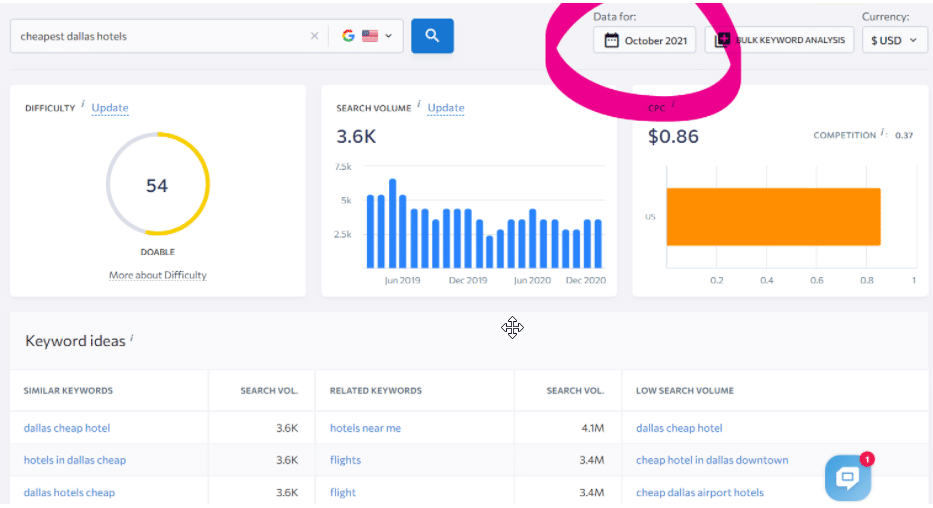
By reviewing past performance, you can gauge how much value a keyword will bring and what types of users do particular searches — i.e., are they top-funnel or bottom-funnel.
3. Find Long-Tail Keywords
In addition to scanning for short-tail keywords, it’s good to look for long-tail keywords you can focus on.
Long-tail keywords are more refined search phrases composed of three to five words. These lengthier phrases often convert better than short-tail keywords because they are more likely to match a user’s specific search intent.
Now that you’ve sorted through your keywords, it’s time to pick out which exact keywords you’ll focus on when revamping your site.
Are travelers finding your hotel and converting on Google? Asksuite & Guestline have combined their efforts to bring you an easy way to get found by travelers and make sure they book with you. Learn how you can use Google Messages and Google Free Links to step up your booking game by downloading our e-book now:
Step 3: Pick Out the Best Keywords for Hotels that Can Rank For
The process of selecting your final list of SEO keywords involves three simple steps:
1. Focus on keywords with high search volume and low competition
The most profitable keywords will be those with a reasonably large search volume and aren’t challenging to rank for. Finding keywords that have both these qualities will be vital in helping you rank higher on the SERPs and increase your overall exposure.
2. Choose primary keywords and additional variations
In addition to evaluating your keywords using key metrics, you will also want to narrow down your choices based on their qualitative relevance to your hotel. For example, if “pet-friendly hotel” shows up as a high-volume, low-competition keyword, but your hotel is not pet-friendly, then you’ll likely not end up using this keyword.
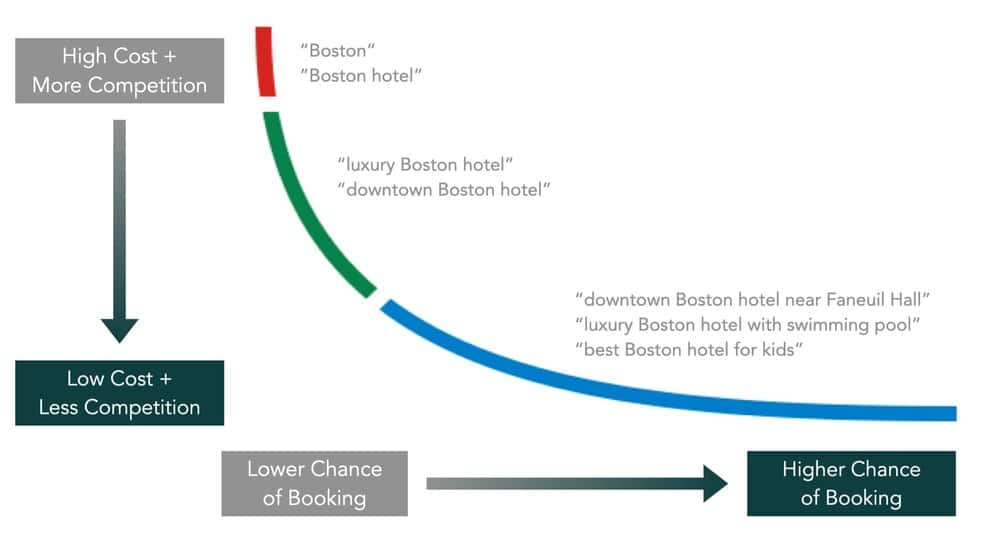
Image source: Five Star Content
3. Group the list of keywords
Finally, a great way to prepare your list to power your future website content strategy is to group your keywords into ‘buckets’ of similar intent. By dividing your list this way, it is easier to create on- and off-page SEO content that will help boost you in the SERPs.

Why Keyword Research & Selection for Hotels Matters
With more and more tourists doing their research online in a very saturated market, it’s more important than ever to ensure your hotel is showing up on its results page. That means getting the strongest keywords relevant to your hotel and structuring on- and off-page SEO with them.
As you’ve seen, the most optimized keyword lists begin with general research — so you’re not wasting time — then move on to refining those lists based on search volume and competition. Ensure you’re taking full advantage of Keyword Suggestion Tools to provide you with all the data you need to kickstart your SEO keyword strategy.
About the author: Alina Tytarenko is part of the marketing team at SE Ranking. She shares her experience in marketing techniques, link building, content marketing, and SEO with readers. Alina knows how to find the best hotel deals via Google.
Are you ready for these online opportunities? A well-structured and organized virtual environment is a key strategy in any business. In this eBook, we cover digital marketing for hotels, online marketing channels strategies, and conversational marketing:




